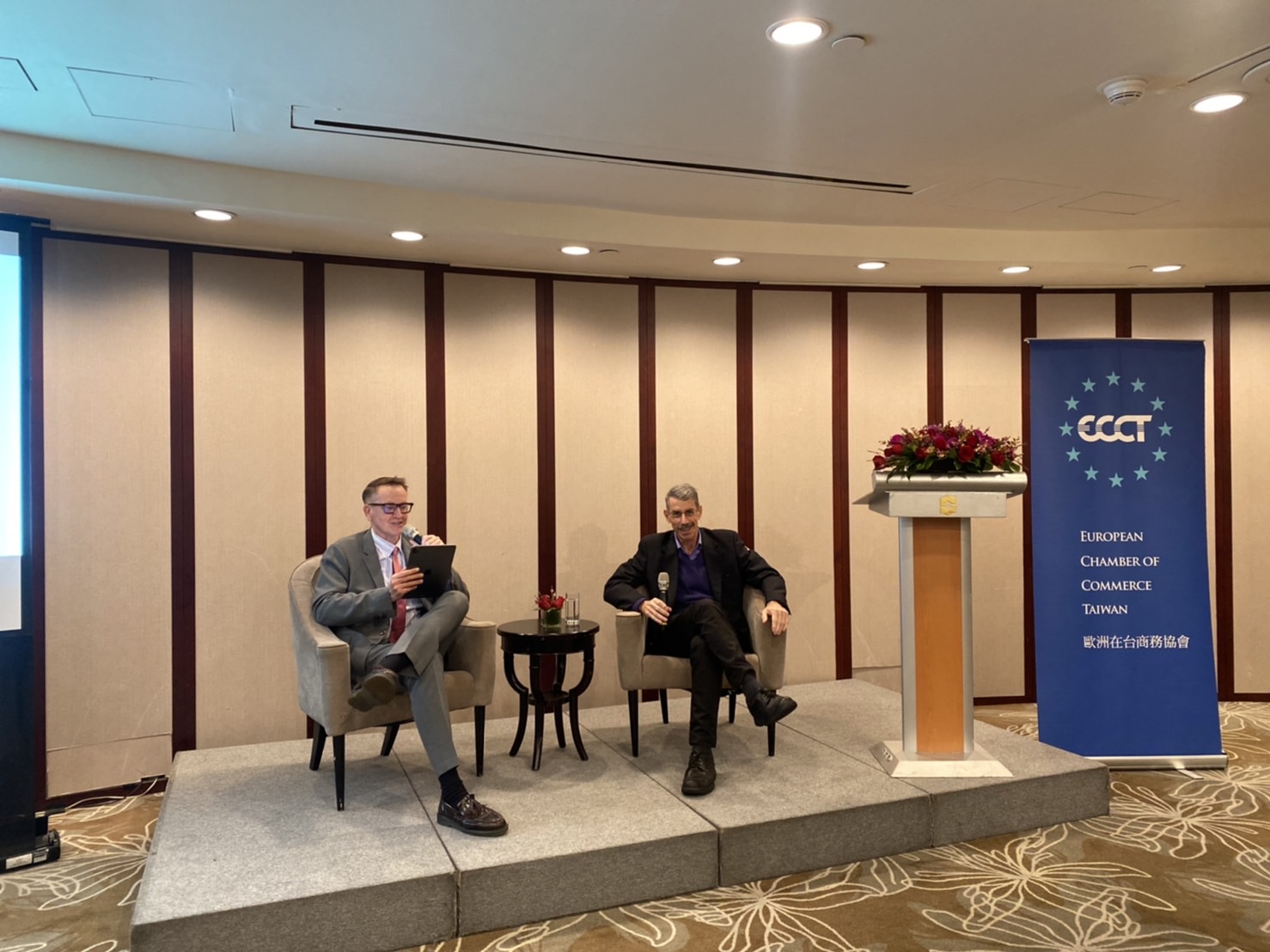Mike Chinoy gives insights on Taiwan Strait issues

The ECCT arranged a Special Lunch featuring guest speaker Mike Chinoy, Non-Resident Senior Fellow at the University of Southern California’s US-China Institute and former CNN Senior Asia Correspondent. In his presentation, Chinoy gave his assessment of the risks of conflict over Taiwan, drawing on insights from the newsletter “Taiwan Strait Risk Report”, which he works on together with Peter Enav. The speech was followed by a Q&A session moderated by Tim Berge, co-chair of the ECCT’s Better Living committee.
Last year, a cover article in The Economist referred to Taiwan as the most dangerous place on earth based on China's continued military modernization and regular operations in the air and seas around Taiwan, a steadily tougher line towards Beijing on the part of the United States, and the clear desire of a majority of people in Taiwan to remain separate from the People's Republic of China. Under the leadership of Xi Jinping, Beijing’s timeline for achieving unification with Taiwan appears to have become tighter. Some military analysts have suggested that an invasion may even come as soon as 2025. While this is not a consensus view, the situation now is quantitatively different from when it was under previous Chinese leaders. The US is taking the risk of conflict in the Taiwan Strait seriously by stepping up military cooperation with its allies in the region, especially Japan, South Korea, and, most recently, The Philippines.
In the view of Chinese leaders, the global financial crisis was the event that convinced them that the US was in terminal decline and China’s rise was inevitable. Meanwhile, the 2014 Sunflower movement in Taiwan led Chinese leaders to conclude that using the Kuomintang in Taiwan to convince the Taiwanese of the benefits of unification with China was not effective. Since then, and especially after the DPP’s election victory in 2016, the Chinese Communist Party leadership has taken a much more aggressive approach towards Taiwan.
There has been much discussion and analysis of whether or not China now has the military capability to conduct a successful amphibious invasion of Taiwan and at what price. Besides the cost in terms of military hardware and potential casualties, the economic impact could be substantial, given the disruption to or even collapse of international trade to and from China, the possible destruction of infrastructure and international sanctions, to name a few. Xi has hitherto shown that he is cautious, which implies that he would only attempt an invasion if he could succeed without doing too much damage to the Chinese economy.
As to whether the US would come to Taiwan’s defence, the US maintains an official policy of strategic ambiguity, although President Joe Biden has said publicly four times that the US would defend Taiwan. Taiwanese should perhaps not be so sanguine though since the US’s support would depend on several factors, especially Taiwan’s demonstration of willingness to defend itself as well as the status of the US’s military deterrent in the region and support in the US (both from the public and the president at the time).
As for demonstrating its willingness to defend itself, military experts have frequently called for a stronger focus by Taiwan on asymmetrical capabilities or a “porcupine” approach that foregoes acquiring expensive hardware like tanks and fighter jets in favour of smaller, more mobile hardware like missiles and missile defence systems. In addition, some experts have called for greater mobilisation of military personnel, such as reservists or creating territorial armies. The Tsai administration has announced its intention to increase the length of military service for conscripts from the current four months to one year, but many analysts do not think this goes far enough.
While relations between Washington and Beijing are currently strained, Xi appears to have shown a desire to ease tensions. However, this was dealt a setback by the recent Chinese surveillance balloon incident (when a Chinese surveillance balloon was shot down by US forces over US waters).
Even if Xi is serious about “resolving the Taiwan issue” as soon as possible, he has other factors to consider besides the military and economic costs. China’s economy has taken a serious hit from Xi’s zero Covid policy (which he championed for most of the pandemic and then abruptly abandoned it), a property market crisis and rapidly shifting demographics. Dealing with domestic problems should keep the Chinese leaders occupied. On the other hand, there is always a risk that Xi could use an adventure abroad to stir up nationalist sentiment and divert attention from problems at home. Another danger is that Xi has surrounded himself with his acolytes and may not be getting unbiased information, which could lead him to overconfidence and miscalculation. Domestic political infighting in the US could also lead Xi to believe that the US is too distracted to get involved in a conflict with China.
The balloon incident showed the dangers of the current environment where there is a lack of trust and little communication between Washington and Beijing. With frequent military sorties happening in the South China Sea, there is a risk of an accident happening, which could ratchet up tensions even further.
Besides the two sides not talking, the exodus of so many foreign correspondents and media organisations from China over recent years has made understanding China even more difficult than it already was. And this lack of texture means that the tensions and negative comments by public officials are amplified, creating an even more negative image of China internationally.
